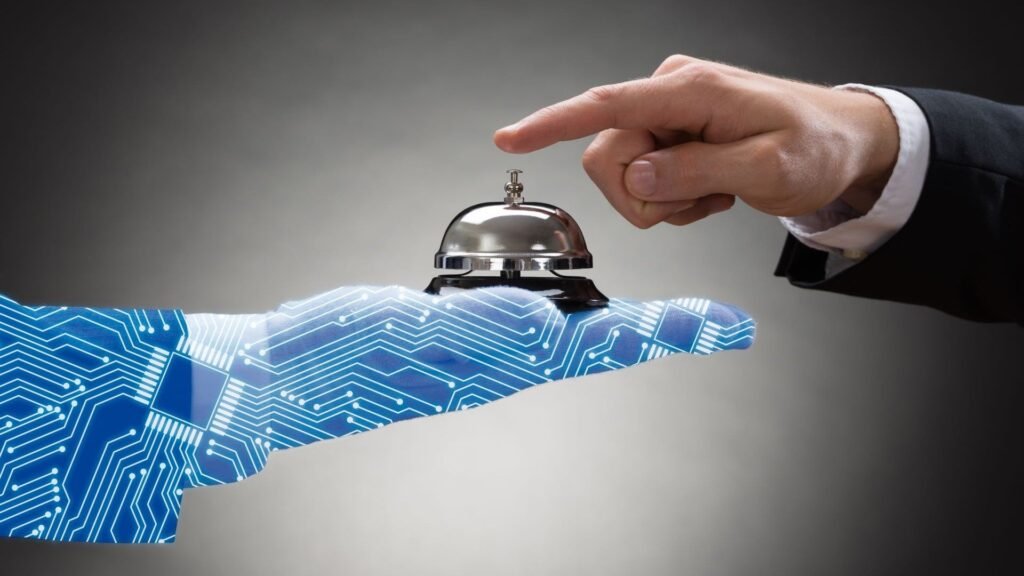
The hospitality industry is experiencing a seismic shift, driven by a surge in technological advancements. From personalised booking experiences to immersive virtual tours and eco-friendly operations, technology is fundamentally reshaping how hotels function and compete.
In this interview, Patryk Luszcz, Regional Director at Profitroom, a leading provider of guest-centric booking engines, marketing automation tools, and channel managers, offers invaluable insights and explores the transformative potential of technology in the hotel industry.
Personalisation through AI: Refining the guest journey
Personalisation has become a cornerstone strategy for hotels seeking to differentiate themselves in a crowded marketplace. However, Luszcz sheds light on a surprising discovery made by Profitroom:
“Personalisation is a key strategy imperative to the independent hotels we work with,” says Luszcz.
“Through extensive AI testing, we’ve found that, AI in its current form isn’t the optimal tool for tailoring the hotel booking experience on a website – other than of course the initial content creation and chatbot personalisation.”
Profitroom’s research revealed minimal conversion improvements with AI-driven custom rate plans, sometimes as low as 0.01% increases.
Access the most comprehensive Company Profiles
on the market, powered by GlobalData. Save hours of research. Gain competitive edge.

Company Profile – free
sample
Your download email will arrive shortly
We are confident about the
unique
quality of our Company Profiles. However, we want you to make the most
beneficial
decision for your business, so we offer a free sample that you can download by
submitting the below form
By GlobalData
“Our goal is to enhance the user journey and drive revenue growth for our clients,” explains Luszcz. “We’ve shifted our AI applications to personalise marketing efforts, adapting to hotel needs, inventory changes, and seasonal trends.”
This shift highlights a crucial point – while AI offers tremendous potential, its effectiveness hinges on careful application.
AI chatbots: Streamlining interactions and future recommendations
On the flip side, AI chatbots hold immense promise for streamlining guest interactions. Luszcz envisions a future where chatbots not only handle routine inquiries and reservations but also provide valuable booking recommendations tailored to individual guest preferences.
“AI chatbots and virtual assistants can aid guest-interactions, such as routine customer queries, reservations, and check-ins to consistently deliver customer service across all online touchpoints,” says Luszcz.
He emphasises the importance of AI in freeing up staff for more strategic tasks, fostering creativity, and prioritising in-person guest experiences.
“AI needs to be a central part of any hotelier’s operations due to its ability to free up staff from routine tasks to prioritise in-person guest experience, creativity and original thinking,” says Luszcz.
This shift towards AI-powered guest interactions has the potential to significantly enhance the overall guest experience.
AI-driven pricing: Ethics and staying competitive
The conversation then delves into the ethical considerations surrounding AI-driven pricing strategies. While acknowledging the broader ethical concerns around AI in society, Luszcz downplays them in the context of hotel pricing.
“While we recognise significant ethical considerations of AI in other aspects of hotel operations and wider society, we do not believe there is a need for the same level of concern for AI-driven pricing strategies,” he states.
Luszcz argues that in the fiercely competitive hospitality industry, hotels must adopt these strategies or risk falling behind competitors.
However, the question of transparency remains. It’s crucial for hotels to strike a balance between leveraging AI for dynamic pricing and ensuring guests understand the rationale behind price fluctuations.
AR technology: A promising future with practical considerations
Augmented reality (AR) offers exciting possibilities for showcasing hotels. Imagine immersive virtual tours with room size comparisons and 360° views, allowing guests to explore the property remotely and make informed booking decisions.
“Hotels can use AR technology to offer immersive virtual tours of their properties, allowing guests to explore rooms and facilities remotely, compare room sizes and 360° views. All of this can help guests make more informed booking decisions,” says Luszcz.
“However, for hoteliers, implementing AR comes with a hefty price tag when similar results can be achieved through high-quality visuals and videos.”
Ultimately, the adoption of AR technology will hinge on finding a balance between cost-effectiveness and guest experience enhancement.
Technical challenges of AR implementation
Luszcz delves deeper into the technical hurdles of AR experiences. With the average guest requiring 19 interactions before confirming a reservation, slow loading AR content can lead to cart abandonment.
“Despite the market’s growing interest in AR and its possibilities, it is important to consider its impact on conversions throughout the booking journey,” explains Luszcz.
“Typically, it takes around 19 interactions with a guest to confirm a reservation. However, integrating high-quality AR content can slow a hotel’s web interface, leading to cart abandonment and reduced conversion rates.”
Furthermore, widespread adoption of VR headsets, necessary for optimal AR experiences, remains limited.
“AR technology is also hindered by the limited number of people who have a VR headset,” says Luszcz. “To truly benefit hotel businesses, wider adoption of this technology is needed, not only at home but wherever potential guests may be.”
Blockchain technology: A wait-and-see approach
Blockchain technology, with its promise of secure and transparent transactions, has captured the imagination of many industries. However, Luszcz expresses a cautious optimism regarding its impact on hotel booking.
“We are looking at the future of hospitality technology over the next 10 years and while blockchain technology is in a clear phase of growth, we are questioning its fundamental impact on the wider industry’s growth and conversion rates,” says Luszcz.
The biggest hurdles to blockchain adoption
“The primary hurdles to widespread blockchain adoption are user functionality, global demand and consumer readiness,” says Luszcz. “Consumer readiness is crucial and current demand may not justify widespread adoption.”
He believes consumer readiness, evident in other industries like retail, will be a key indicator for the hospitality sector.
“A key indication of this readiness will be within retail industries and we expect hospitality to mirror retail trends for blockchain,” says Luszcz.
Only time will tell if blockchain technology will revolutionise hotel booking platforms, but its potential for secure and transparent transactions cannot be ignored.
Website analytics: Driving conversions through data
Harnessing website analytics is crucial for hotels to improve online booking conversion rates.
Luszcz emphasises the value of GA4 analytics, a tool that, when integrated with AI, helps understand guest preferences and tailor marketing efforts based on specific hotel amenities.
“GA4 analytics emerged as a great tool last year, driven mainly by Google traffic. We’ve has proactively integrated it with AI to understand guest preferences better and to better tailor marketing efforts based on the hotel’s facilities such as spa services and restaurant offerings,” says Luszcz.
“Our Profitroom platform also tracks the level of a hotel’s unavailability rate, which is when site visitors encounter no availability within their preferred dates of stay,” explains Luszcz.
“Tracking this in tandem with website traffic allows our hoteliers to adjust marketing spending, reallocating resources from PPC and paid ads when they are unable to convert due to unavailability.”
By leveraging website analytics, hotels can gain invaluable insights into guest behaviour and optimise their marketing strategies for maximum impact.
The future of hospitality: Embracing change and personalisation
Looking ahead, Luszcz emphasises the transformative potential of technology.
“Looking ahead, technological advancements are set to revolutionise how hotels operate and compete. Embracing AI is crucial; those who don’t risk falling behind,” warns Luszcz.
“As consumers become more tech-savvy, hotels must adapt to meet consumer expectations.”
“With recent reports of search engines penalising mass-produced AI-generated content, prioritising ultra-personalisation is crucial. It should be tailored to each hotel’s offerings and the specific preferences of their guests,” concludes Luszcz.


